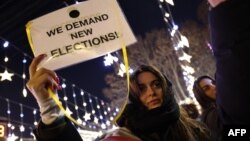Tens of thousands of pro-Europe demonstrators rallied outside Georgia’s parliament Tuesday night to celebrate the New Year, continuing month-long protests against the government.
The Black Sea nation has been in the grip of an unprecedented constitutional crisis since the ruling Georgian Dream Party — widely perceived as increasingly repressive — claimed victory in October’s parliamentary polls, which the pro-Western opposition denounced as rigged.
The government’s Nov. 28 decision to suspend EU accession talks for years triggered daily mass protests that continue to this day.
On New Year’s Eve, tens of thousands gathered outside parliament in central Tbilisi waving EU and Georgian flags — the latest outpouring of popular unity in the face of what critics say is the government’s authoritarian pro-Russian tilt.
Many demonstrators brought food to share and set up a festive table spanning dozens of meters on Tbilisi’s main avenue decorated with Christmas lights, transforming the 34th consecutive day of protests into a New Year celebration.
“Tonight once again proves that the Georgian people will not allow a pro-Russian government to turn our country into a Russian-style despotism,” said one demonstrator, 42-year-old Ilia Darsavelidze.
“[Russian President Vladimir] Putin’s puppets in Tbilisi are powerless against the will of our entire nation. We will reclaim our rightful place in Europe.”
Georgia’s outgoing President Salome Zurabishvili — at loggerheads with the ruling party — joined the demonstrators.
“2024 was the year of our unity, and 2025 will be the year of our victory,” she told the crowd.
Zurabishvili’s mandate was meant to end on Dec. 29, when her successor and Georgian Dream loyalist Mikheil Kavelashvili was inaugurated as Georgia’s next figurehead president, following a controversial election process.
But Zurabishvili refused to step down, saying she remains the country’s “only legitimate leader” until October’s election is rerun.
She has earlier declared the new parliament and government “illegitimate,” while opposition parties have refused to enter the new legislature.
In the first 10 days of protests, riot police used tear gas and water cannons to disperse demonstrators — some of whom threw fireworks and stones.
The Interior Ministry reported more than 400 arrests, while the country’s top human rights official, ombudsman Levan Ioseliani, and Amnesty International have accused security forces of “torturing” those detained.
The reported police brutality has drawn growing international condemnation, with Washington and several European countries sanctioning Georgian Dream officials.
The foreign ministers of Germany, France and Poland said on Tuesday that Georgian authorities should consider fresh elections as a way out of the country’s political crisis.
The Georgian Dream Party’s government faces accusations of an authoritarian, pro-Russian shift that has undermined Georgia’s EU bid, a goal enshrined in the constitution and supported by 80% of the population.



